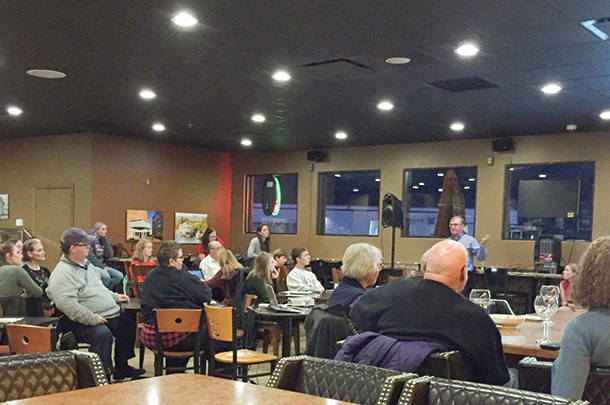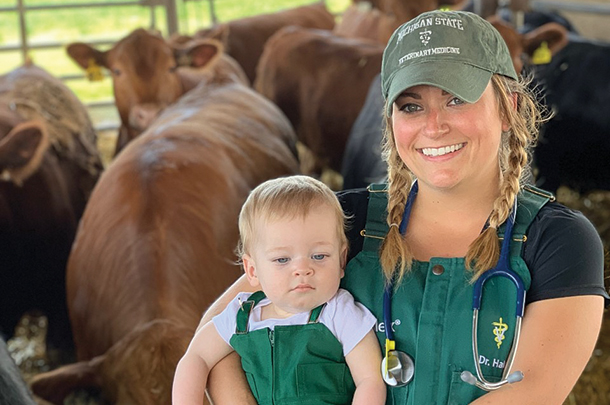For the hardcore advocates, every month is dairy month. These individuals wear all kinds of hats and come from all walks of the dairy world – from farmers in the field to enthusiasts to highly esteemed professionals.
In a world frustratingly far removed from agriculture, its own story must be told from the mouths of individuals who live and breathe it every day.
Three individuals who have taken on the “agvocate” role, spreading the truth and joy of dairying online or in the real world, share their experiences, insights and thoughts on what it takes to be on the front lines of education and advocacy work in 2020.
‘Nyfarmgirls’
The three Leubner sisters of Maple Lane Farms in central New York – Evelyn, Claudia and Jojo – represent the “nyfarmgirls” account on several social media platforms. They started their advocacy journey in 2015. The sisters are the fourth generation on the dairy and crop operation.
Evelyn is 21 and a senior at SUNY Cobleskill obtaining a bachelor’s degree in animal science. Claudia, 18, is a high school senior who will be attending the University of Nebraska – Lincoln this fall, majoring in agricultural business and entrepreneurship. Jojo is the youngest sister, at 15 years old, and is a high school freshman. Evelyn provided the responses on behalf of the trio.
Mark Misch
 Mark Misch has found a place doing dairy outreach presentations alongside his job at DCC Waterbeds. Photo courtesy University of Wisconsin – La Crosse.
Mark Misch has found a place doing dairy outreach presentations alongside his job at DCC Waterbeds. Photo courtesy University of Wisconsin – La Crosse.A Wisconsin native, Misch is a graduate of UW – River Falls and has spent the last six of his 39-year career in equipment sales with DCC Waterbeds. As part of his position with DCC, Misch has given a PowerPoint dairy talk for the past two years, educating consumers about topics of food safety, animal welfare and a cow’s life.
Dr. Marissa Hake
 Dr. Marissa Hake, DVM, pictured with her son, McCoy, is a social media veterinary and dairy personality known online as Dr. Hake, Calf Vet. Photo courtesy Marissa Hake.
Dr. Marissa Hake, DVM, pictured with her son, McCoy, is a social media veterinary and dairy personality known online as Dr. Hake, Calf Vet. Photo courtesy Marissa Hake.Inspired by her retired dairy farmer grandfather, Hake became a dairy veterinarian. Most of her career has been spent with youngstock, hence her internet identity as the “Calf Vet” across various social media platforms. Recently, Hake took a position with fairlife LLC as director of animal welfare and sustainable farming.
How and why did you get involved in dairy education and advocacy?
MISCH: The real motivation came while I sat in the hot tub at the YMCA after a Pilates class and listened to people’s understanding of agriculture. I heard smart individuals saying inaccurate things they probably got off the web or heard from a friend, so I’d offer another perspective. They were surprised by the facts regarding antibiotics in milk and other topics. This inspired me to develop a 40-minute PowerPoint presentation answering some of the basic questions people were wondering about.
HAKE: I started sharing my story of veterinary medicine, farming and just general day-to-day life about four years ago after having bloggers tour some calf-raising facilities. Their followers had lots of questions, so I created @CalfVet on Facebook, Instagram, YouTube and Twitter. I realized there was a tremendous need for firsthand, trustworthy information, and I just continued to share.
LEUBNER: We started our page because we had so many cow and calf pictures but nowhere to put them. As we started sharing our life on the dairy farm, we realized a large portion of the public were clueless about where their food was coming from and how it was raised. It seemed the negative connotation about dairy farming was outweighing the positive. We set out on a mission to change that and truly believe our presence on social media has impacted the way consumers see dairy farmers and our practices.
What do you find most rewarding when you tell the story of dairy?
MISCH: After one presentation a gentleman came up and said, “My wife dragged me here kicking and screaming, but dairy farming is fascinating.” I don’t garner the biggest crowds, but the feedback after the presentation is rewarding. The average person has no experience in dairy farming and hence little idea what goes into the milk in their cereal or ice cream in their freezer. When I get their feedback, giving them an appreciation for the role of the dairy farmer is pretty rewarding.
HAKE: The best part is being yourself. I post a lot of “behind the scenes” stuff about my life as a farmer’s wife, a toddler mom and normal human. Most people don’t know where their food comes from, but they really don’t know who raises their food either. Having a connection with someone’s face and life is incredibly valuable when trying to build consumer trust. Through sharing my story – my whole story, the struggles, wins and the mundane – I have tried to become a trusted platform where people can come and ask questions about how their food is raised and produced.
LEUBNER: There are so many consumers [who] want to learn about how we produce our food, but the negative, false, dairy propaganda blasted by anti-dairy groups tend to reach them first. We love when people come to us with questions about how our animals are raised. They often leave with a new perception about dairy farmers. We have the ability through social media to show them firsthand experiences on the dairy, and that helps them relate to us more and trust us as farmers.
What challenges do you face?
MISCH: For me, it’s getting a crowd and finding the best way to invite people with an interest. I have done two TV interviews inviting people to the presentations. I have called all the local politicians and invited them. I have contacted University of Wisconsin – La Crosse, as they have sent students from the environmental science program to listen and even put up flyers.
HAKE: I’ve had frank discussions with a lot of fellow “dairy bloggers,” and we all share the same sentiment: No one understands. Our co-ops, companies and other farmers don’t understand what it’s like to be under a social media attack. Besides being incredibly time-consuming, it’s mentally stressful and sometimes downright scary to deal with people who openly attack your profession, your morals and wish you and your family harm.
LEUBNER: The point of our page is to reach consumers and the movable middle that are curious about our practices. With that being said, we face a lot of hateful comments from anti-dairy groups such as extremist vegans and animal rights activists. Our livelihood is constantly being hated on by those groups. We have learned how to handle the keyboard warriors over the years and continue to utilize our page as a way to share the truth. Being a voice for the dairy industry requires a lot of pride and thick skin.
What are some ways all dairy producers and industry professionals can spread the messages of June Dairy Month, especially using social media because of limited access to in-person events? How do you intend to utilize the month?
MISCH: I had two talks scheduled – one for the Park & Recreation Department in La Crosse (rescheduled for August) and the other is for the American Family DreamBank in Madison. Many people don’t understand dairy farmers get up at 5 a.m. or earlier every morning. It might be interesting for a local paper, website or blog to post “A day in the life” feature where a dairy farmer describes a “normal day.” I contacted a local TV station and asked them to read a fun fact of dairy every day in June from a list I provided. They asked me if I wanted to do an interview to kick off the month.
HAKE: I encourage everyone to support the industry as a whole and work to move the needle together – regardless of farm size or production practice. Try to connect with people outside of dairy; you can always share other dairy promotions and remember to keep sharing them all month. Messages that promote the great nutrition of dairy along with recipes are a great way to engage consumers who might be cooking more while being at home. Last year, I highlighted dairy veterinarians across the U.S. and showed how they work with farmers to ensure that our cows and calves are well cared for as well as ensuring safe milk supply. This year I will be participating in “Live” fitness workouts and then sharing how I am using dairy to refuel.
LEUBNER: We cannot stress this enough to producers: The days of staying quiet and ignoring consumers’ concerns are gone. We need to share our livelihood with the public as a way to stay transparent. There are no more excuses to stay quiet; we need you. During June Dairy Month, it is crucial for us as producers to explain our practices to consumers and share our daily lives on the farm. If you are able to open your farm to the public, great – that is the best way to impact our consumers.
At the very least, you should be sharing life on the farm through social media. If you are not sharing your story, someone else will, and that isn’t always a good thing. We will be utilizing this month to share every part of our business as an effort to be transparent with consumers. We encourage anyone looking for tips on getting started in sharing your story through social media or dealing with hateful comments to please reach out to us.






